Movie Review
 |
 |
 |
 |
 |
 |
 |
A Feminist Revolt against the Natural Order
Salwa Bachar
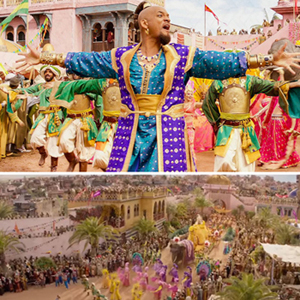
Colorful ambiences make up part of the marvelous
The trailers for the movie had a lot of color and brilliance in the ambiences,. costumes and characters. This color and brilliance is the marvelous (1) in the movie, an important aspect of fairy tales that should help children to learn about the world while keeping their innocence.
However, the marvelous in this movie was instead used to destroy their innocence by bringing them to accept many tenets of the Revolution, particularly Feminism.
It seems opportune to discuss some general impressions.
Vulgarity & effeminacy in men
One of the main characters – the Genie – is played by Will Smith, who lends to the character notes of both vulgarity and effeminacy. Vulgarity is present in the characters’ way of being, as well as in the general ambience of jazz, hip-hop, beat-boxing and break-dancing.
A vulgar and effeminate Genie
This leads children to accept “gender-bending” and other sorts of transvestism.
Immodesty & sensuality in women
The women in the movie (particularly the main character, Princess Jasmine) are immodestly dressed and portrayed as sensual and erotic.
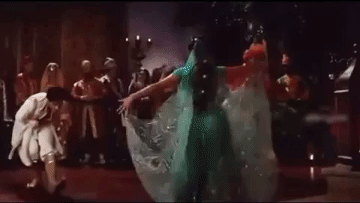
A sensual princess and maids bellydancing
Young girls will see this clearly and will imitate, while the boys will see it and believe that a woman’s way of being should be erotic. Here is another aspect of this Disney film that destroys innocence and purity in children.
Princess Jasmine becomes Sultan
My strongest lasting impression of the movie was the blatant feminist propaganda and plot deviation from the original story.
In the 1992 “original,” Aladdin, a street urchin, who steals to get by, falls in love with the daughter of the Sultan, Princess Jasmine, who hopes to marry for love. Jafar, the Vizier to the Sultan and an evil sorcerer, tricks Aladdin into going into the Cave of Wonders, where he acquires the magic lamp. Aladdin uses the magic lamp to summon the Genie and, since Princess Jasmine can only marry a prince, Aladdin asks the Genie to make him a prince.
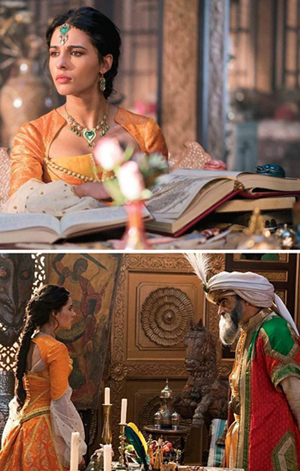
A disobedient girl who gets what she wants
In this 2019 version however, Princess Jasmine is not interested in marrying, but rather is intent on becoming the Sultan, a position her father holds, one that has always been characteristically male. This is a disturbing departure from any previous version of the story of Aladdin.
Disobedient not only to her father but also the natural order, Princess Jasmine makes it clear from the beginning of the movie her interest in becoming Sultan, and believes she deserves the title because she studies geography, politics and military strategy more than any other male claimant to the throne.
The Sultan in the movie has a certain majesty, but in general all of the men in the movie are portrayed as weak and foolish. The Sultan particularly is portrayed as a buffoonish type who is easily fooled and does not really know how to reign. It is Princess Jasmine who knows how to reign better than her father because she is closer to the “heart” of the people. The Vizier Jafar also wishes to be Sultan, and it is implied that Jafar killed the mother of Princess Jasmine in order to gain more influence in the fictional Kingdom of Agrabah.
Jasmine & Jafar
In this 2019 version, Jasmine and Jafar are surprisingly similar, since both revolt against order. The latter only revolts against the social order, while the former revolts against the natural order. Both do not seem to “know their place.”
In fact, early on in the movie, the Sultan tells Jafar “Know your place” when Jafar attempts to impose something on him. Later, when Princess Jasmine sees that Jafar is counseling her father to invade the neighboring kingdom (the kingdom of her late mother), she protests and insists that she should be Sultan because she studies maps and politics. Jafar reminds her that women should be “seen and not heard,” effectively telling her the same “know your place” that Jafar received from the Sultan.
The feminist propaganda comes to an apogee when Princess Jasmine responds to Jafar’s insults with a musical temper tantrum, a solo song titled “Speechless.” Here is a sample of the lyrics:
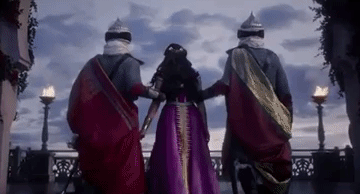
Jasmine throws an unpleasant temper tantrum
Centuries-old and unbending.
Stay in your place, better seen and not heard,
Well, now that story's ending,
But I won't cry,
And I won't start to crumble,
Whenever they try,
To shut me or cut me down,
I won't be silenced,
You can't keep me quiet,
Won't tremble when you try it,
All I know is I won't go speechless.”
Islam & Feminism
To really understand this story of Aladdin, we have to remember it is set in a fictional Islamic Kingdom. Therefore, Islam is the backdrop. As is commonly understood, Islam is a religion where women are made to be the property of men to satisfy all of their sexual desires.
I won’t go into detail regarding the disgusting things that Islam teaches, but just with this said, it is understandable that Muslim women are always portrayed in a state of revolt, considering their situation is a kind of pagan slavery. However, in this movie, Feminism is being presented as a false antidote to the problem.
Disney & Feminism
Then again, the 2019 Aladdin is simply another example of Disney’s recent obsession with Feminism.
Similar “strong” female princesses have been the focus of Disney’s recent films: Frozen (2013) features Elsa who doesn’t want to be “the good girl she always has to be;” Moana (2016) presents a princess who “can lead with pride and make [her people] strong;” Brave (2012) - reviewed by TIA here - features Merida who “just wants her freedom.”
It is always the same story: the young women stand forward to “liberate” themselves from the supposedly misogynistic constraints of patriarchal society – from nobility, from their parents, from men.
Sour taste of Feminism
In the end, Aladdin gets Princess Jasmine, while Princess Jasmine gets him and everything else: She becomes Sultan, which was always her primary concern in order to do away with “outdated traditions” and bring women to their “rightful place.” Aladdin seems to be only the cherry on top of the cake, a nice little love interest to keep around whenever her whims move her.
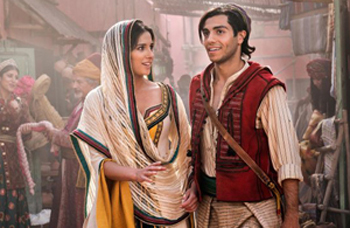
Jasmine gets Aladdin and the throne in the end
Overall, besides the colorful ambiences and characters, I believe there is hardly anything redeemable in this movie, considering its blatant feminist indoctrination. The movie is not even about Aladdin, since it focuses more on Princess Jasmine anyway. Maybe a more fitting title for this movie would be: “Princess Jasmine: Tales of a Sultan Wannabe” or, perhaps, “Jasmine: The Story of a Troubled Feminist”.
- I adopt here the “marvelous” in the meaning coined by Dr. Plinio Corrêa de Oliveira to describe beautiful things that evoke the material realities of the Earthly Paradise and the immaterial realities of Heaven. In brief, anything that is beautiful, majestic, brilliant inspires in an innocent soul a sense of wonder that tends to glorify God as the exemplar cause of the created universe.

Posted June 7, 2019
______________________
______________________
 Volume I |
 Volume II |
 Volume III |
 Volume IV |
 Volume V |
 Volume VI |
 Volume VII |
 Volume VIII |
 Volume IX |
 Volume X |
 Volume XI |
 Special Edition |


